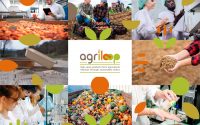Event Information
Meeting farming’s sustainability challenge: circular approaches to make agriculture ‘greener’ and more profitable.
Emma Needham, Head of Communications, The Biorenewables Development Centre.
How can we continue to provide the world’s growing population with nutritious, affordable food in a way that is both environmentally and economically sustainable? One approach is to adopt a ‘circular’ approach where underused crop residues, food processing wastes and manures are used to make high-value products for the food, health and farming industries. Tomato skins, wheat straw, brewery waste and potato peelings all being investigated for their potential as a source of high-value compounds that can be used to make products such as proteins, bio-plastics and fertilisers: an approach that avoids waste to landfill, reduces greenhouse gas emissions and lessens our dependence on fossil fuels.
This event will be an opportunity to find out about the latest research from the European-Chinese research consortium AgriLoop and the UK-based Biorenewables Development Centre (BDC).
It will also be an opportunity to explore issues such as: the environmental impact of agriculture, the potential and risks from using ‘waste’ as a resource and the transition away from fossil fuels.
Member’s report:
Around 35 interested minds joined the team from the Biorenewables Development Centre in the basement venue at the Micklegate Social for an evening of education and discussion. The Biorenewables Development Centre, or BDC for short, is located east of York in Dunnington, and is a joint venture of the departments of Biology and Chemistry at the University of York. The team, comprising Emma Needham, Alice North, Helen Shiels and Elspeth Bartlett aimed to introduce us to the BDC and illustrate the types of projects it is currently involved in. These were themed around the title of the session, namely: “How can we continue to provide the world’s growing population with nutritious affordable food in a way that is both environmentally and economically sustainable”.
Following a brief overview from Emma introducing the BDC and her colleagues, Elspeth started the discussion around waste. We waste a lot of stuff, especially food, where nearly a third is thrown away in the UK. This is a shocking statistic, and while supermarkets are making positive changes to try to donate out-of-date food to foodbanks and rotate it more on the shelves, there are still huge shifts in consumer attitude that need to be addressed to reduce this significantly. Some of the waste comes during the manufacturing of the food itself and here there are opportunities for getting more out of this material. Elspeth highlighted some Yorkshire examples, reminding us that 40% of the UK’s fish is processed on the Humber, generating much potential waste material for budding biological entrepreneurs.
Helen then talked more about what the BDC actually does, in providing expertise and facilities to take processes from the scale used by researchers in a lab, to that needed by industry and understanding all these problems of ‘scale-up’. They work across many sectors beyond food and drink, including bioenergy, biobased textiles and other novel uses of plant-based raw materials. As well as the lab-based work, the BDC also undertakes market research for companies who are looking to decrease waste and/or use more sustainable materials, including regionally relevant companies like Croda and Drax, both sited nearby at Goole, and Quorn in Teesside.
Alice then talked about BioYorkshire as an enterprise to focus related activities across local education and industry organisations and later gave an example of potato peel as a potentially underused material, highlighting some research at the BDC on extracting protein, which has value in animal feed, from the peel before it is sent for composting or anaerobic digestion. They worked with a small company called B-hive to look at the scale up of the extraction process to commercial volumes and the project was successful as B-hive has now had major investment to take this process forward. There was a good discussion with the audience about the hidden costs of getting this extra protein from peel, with transportation and energy costs in extracting small amounts of additional material, which certainly is part of the equation. The concept of the biorefinery was mentioned, where multiple processes are integrated into a single site to reduce costs. There were also some other great questions from the floor about less obvious ‘waste’ materials like wool that are crying out for new uses given their currently extremely low value. This is an example of where consumers have turned to less scratchy wools like merino and cashmere over British wool, hence driving down the price, and companies now packaging the wools as ‘environmentally friendly roof insulation’ were mentioned.
Following the questions, there was a fun quiz for the audience who worked in teams to try and identify the recycled material that was the primary component of different household and lifestyle products, which certainly had some surprises. The team closed the session by flagging their upcoming presentation on the “Power of Poo” at this year’s Festival of Ideas in York, so look, or should I say smell, them out for that this summer.
Gavin H. Thomas.

